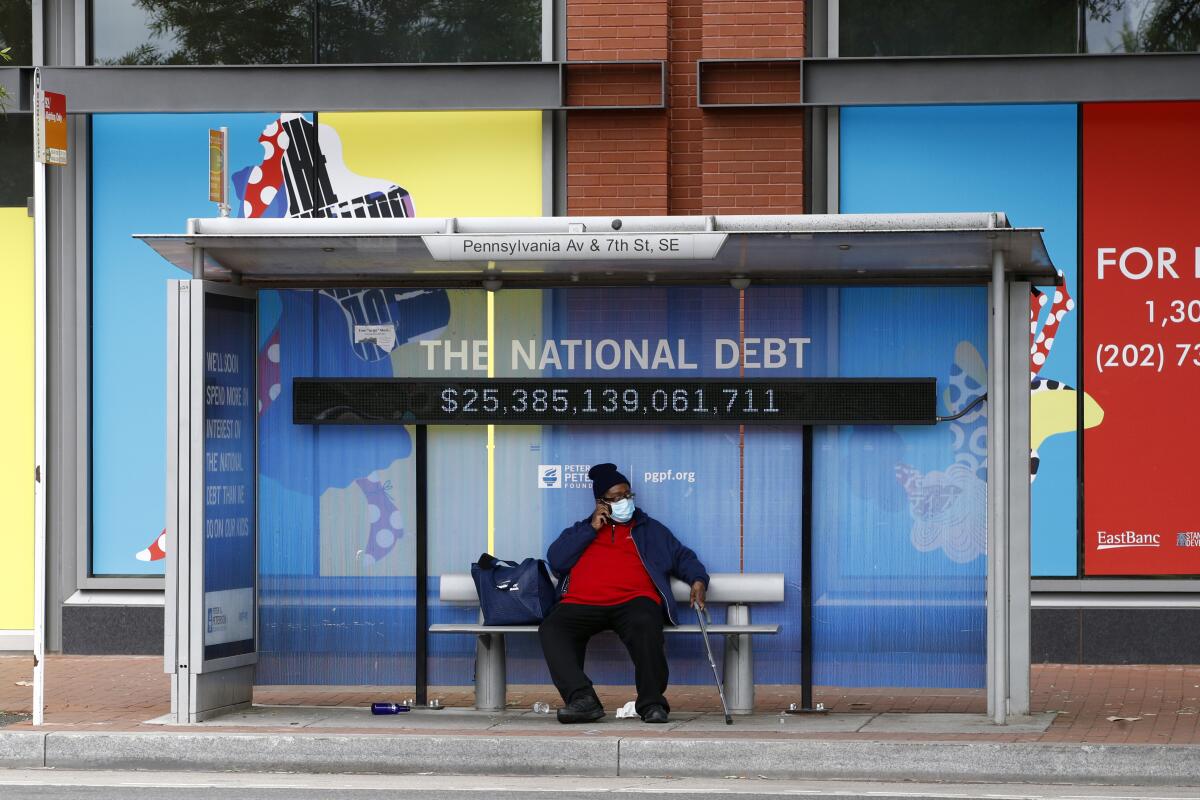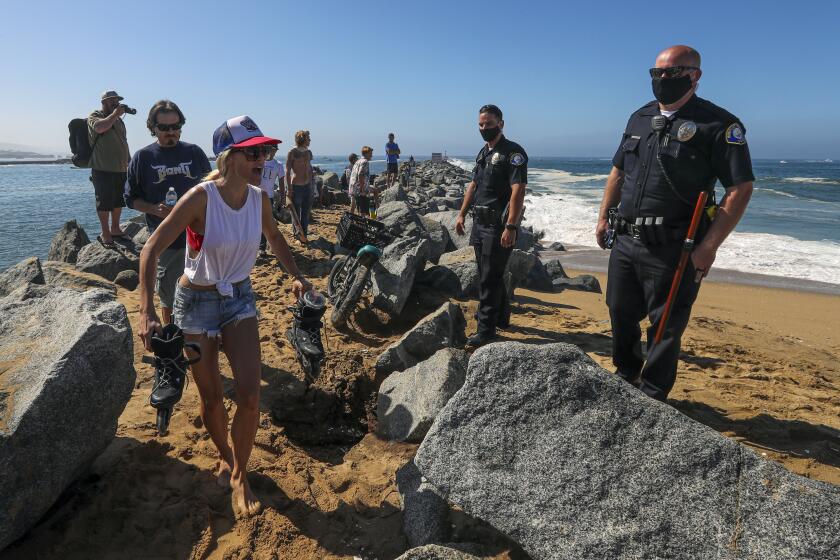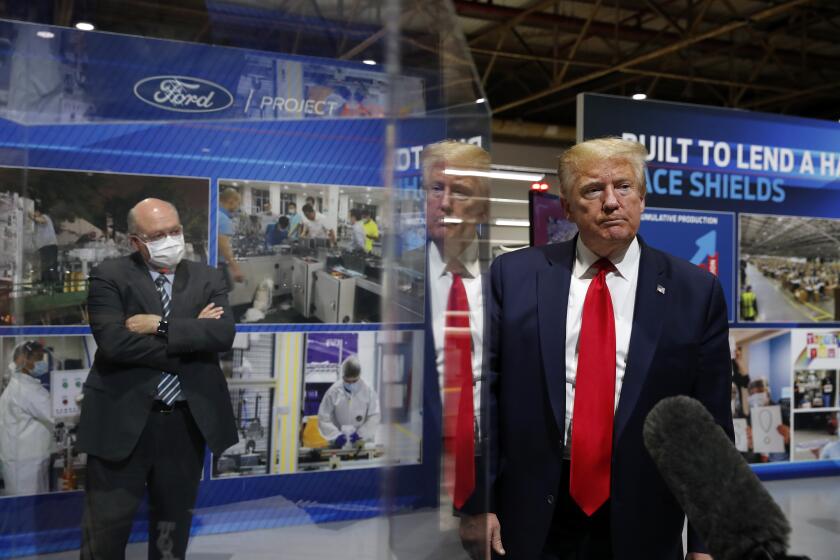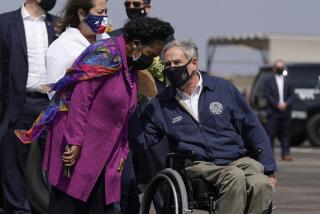Coronavirus cases hit 5 million globally as U.S. death toll approaches 100,000

- Share via
Global cases of the coronavirus have surpassed 5 million as the U.S. death toll approaches 100,000 and states continue to reopen their economies and public spaces. Americans worry about their states opening too soon, according to a new poll, even as another study shows more people are venturing out.
Some former hot spots, including New York, have continued to see decreases in hospitalizations, new cases and deaths. Gov. Andrew Cuomo said that on Wednesday, 5,187 people in the state were hospitalized for COVID-19, a 383-person decrease from the day before. More than 28,600 people in New York have died in the coronavirus outbreak.
“We got through it, we got over the mountain,” Cuomo said Thursday. He said that contact tracing has started in the state, and that if residents get a call from “NYS Contact Tracing” that “it’s not a hoax.”
Regions of New York have started reopening and some beaches in the state will be open at 50% capacity for Memorial Day weekend.
District of Columbia Mayor Muriel Bowser said Thursday that the district has reached nearly all the benchmarks necessary to begin a phased reopening, including a decrease in community spread, increased testing, sufficient hospital capacity and contact tracing. If trends hold over the weekend, the district could see looser restrictions by May 29, she said. Bowser said the first set of contact tracers in the district will complete training by June 1.
In New Jersey, Gov. Phil Murphy said that although hospitalizations, cases and deaths are trending downward, the state still leads its neighbors in those categories on a per capita basis. “While we’re trying to move as quickly as we can, we’re moving as safely as we must,” Murphy said regarding reopening the state, where more than 10,700 people have died from COVID-19.
Americans continue to be concerned about lifting restrictions too quickly, according to a Associated Press-NORC Center for Public Affairs Research poll conducted May 14-18 and released Wednesday. Of those surveyed, 54% said they were extremely or very concerned that opening their states would lead to a spike in new cases.
While most people are still isolating, there has also been a noticeable drop in the number of people avoiding public spaces and small gatherings, according to a Gallup poll conducted from May 11-17 and released Thursday. The percentage of people who said they were avoiding public spaces dropped from 78% the week leading up to April 12 to 65% the week leading up to May 17, and the number of those skipping small gatherings dropped from 84% to 63% among those polled.
States and local governments have been attempting to weigh the risks of allowing businesses to reopen with the economic devastation brought about by the pandemic. Another 2.4 million people workers filed jobless claims last week, according to a government report out Thursday, bringing the total claims to nearly 39 million in nine weeks.
There have been 1.5 million recorded coronavirus cases in the U.S. and more than 93,800 deaths from COVID-19, the disease caused by the virus, according to John Hopkins University.
On Thursday, House Speaker Nancy Pelosi (D-San Francisco) and Senate Minority Leader Charles E. Schumer (D-N.Y.) wrote to President Trump asking him to order flags be lowered to half staff the day the country reaches 100,000 deaths.
“It would serve as a national expression of grief so needed by everyone in our country,” they wrote.
Trump tweeted later in the day that flags at federal buildings and national monuments will be lowered “over the next three days in memory of the Americans we have lost” to COVID-19.
COVID-19 deaths in U.S. surpass 90,000 as hard-hit New York inches toward reopening.
Epidemiologists at Columbia University estimated that enacting social distancing measures one week earlier would have lowered the number of COVID-19 deaths by 36,000. The study, posted Wednesday, has not been peer reviewed.
Asked about the Columbia University study, Cuomo said there were several unknowns about the early spread of the virus. “If this country knew more and knew it earlier, I think we could have saved many more lives,” he said. “Now, who should have known is above my pay grade.”
Cuomo has faced some criticism for lagging some other local governments and states, including California and Washington, in mandating social distancing measures. New York’s stay-at-home order went into effect March 22.
Trump dismissed the Columbia study in remarks to reporters on his way to a Ford manufacturing plant in Michigan on Thursday. “I was so early, I was earlier than anybody thought,” he said. “I think it’s just a political hit job, if you want to know the truth.”
In fact, Trump downplayed the risks from the coronavirus for weeks and left it to state and local leaders to determine whether to order residents to stay home to stop the spread of the disease.
Asked whether he would wear a mask at the Ford factory, which has pivoted to manufacturing ventilators and personal protective equipment, Trump said he would “look at it.” He ultimately declined to wear a mask on the public portion of the tour.
State officials had pointed to an executive order by Gov. Gretchen Whitmer and Ford’s own social distancing guidelines to urge the president to wear a mask.
Michigan State Atty. Gen. Dana Nessel said in an open letter to the president that Trump had a legal, as well as a “social and moral responsibility” to take precautions to prevent the spread of the virus.
President Trump went to a Ford plant in Michigan for a visit cloaked in controversy over his threats to cut funding to the battleground state and questions of whether he would defy state guidelines requiring protective face masks.
The state, already a hot spot for COVID-19, is also dealing with flooding in Midland County after two dams burst this week.
“This is truly a crisis in the middle of a crisis,” said Whitmer, who urged people in the region to continue to take precautions to protect themselves from the virus. “We don’t want COVID-19 to grow, especially in a region where we’ve had to move people around so much.”
The president approved Whitmer’s request for a national emergency declaration in the region on Thursday.
The two spoke on the phone late Wednesday afternoon about the extent of the damage and any casualties, Whitmer said at a news conference Thursday. She said he asked if she’d join him if he is able to tour flooding in Midland. “I said of course I would,” she said.
The Democratic governor and Trump developed a contentious relationship in the early stages of the coronavirus outbreak, when she criticized the administration for creating a climate where states were bidding against one another for equipment to fight the pandemic. Trump responded by calling her “that woman from Michigan” and tweeting that she was “way in over her head.”
On Wednesday, Trump threatened to withhold funding to Michigan, as well as Nevada, for making it easier for residents to vote by mail to reduce exposure to the coronavirus. He tweeted wrongly that Michigan had sent ballots to all of its voters. Election officials sent ballot applications.
Michigan also made moves to loosen social distancing restrictions. Whitmer announced Thursday that small gatherings of 10 or fewer people will be allowed starting immediately, as long as participants adhere to social distancing guidelines. Looking ahead to Memorial Day weekend, she cautioned residents to celebrate responsibly.
“You can take the boat out, you can have a beer, grill some burgers, or have a water balloon fight with your children,” she said. “But please remember to stay safe.”
Times staff writers Chris Megerian and Eli Stokols in the Washington bureau and the Associated Press contributed to this report.
More to Read
Sign up for Essential California
The most important California stories and recommendations in your inbox every morning.
You may occasionally receive promotional content from the Los Angeles Times.
















